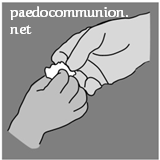Filed In:
All Ate the Same Spiritual Food (Paedocommunion),
All Were Baptized in the Cloud and in the Sea (Paedobaptism)
“Judging ourselves rightly has been the common fear of many a Christian at the Lord’s table – as if it were about being good enough to get to the table.”
THE CALL TO “BE WHO YOU ARE”
Paul frequently tells his hearers to “be who you are.”
In the following the underlined are the identity (“who you are“), and the bold are the call (“be who you are“):
Therefore, [since] you received Christ Jesus the Lord, so walk in him… (Col 2.6)
1What shall we say then? Are we to continue in sin that grace may abound? 2By no means! How can we who died to sin still live in it? 3Do you not know that all of us who have been baptized into Christ Jesus were baptized into his death?…So you also must consider yourselves dead to sin and alive to God in Christ Jesus. (Rom 6.1-3, 11)
Cleanse out the old leaven that you may be a new lump, [since] you really are unleavened. (1 Cor 5.7)
WHO WE ARE, WHO WE MUST BE
In 1 Corinthians, Paul commands believers this way to live out of their identity; and he has two major identity themes I want to highlight here, and they converge in our pericope (1 Cor 10-12).
- – The body is one. [Jews and Gentiles are united in a single family, rich and poor together, not factionalized]
- – The body is holy.
As you skim the following, keep in mind that the opposites show up too- UNITY: disunity/fragmentation/strife/jealousy/division; HOLINESS: immorality, disobedience, unrighteousness.
Let’s examine a few passages before we see their convergence in chapter 11.
- UNITY: 10I appeal to you, brothers, by the name of our Lord Jesus Christ, that all of you agree, and that there be no divisions among you, but that you be united in the same mind and the same judgment. 11For it has been reported to me by Chloe’s people that there is quarreling among you, my brothers. 12What I mean is that each one of you says, “I follow Paul,” or “I follow Apollos,” or “I follow Cephas,” or “I follow Christ.” 13 Is Christ divided? Was Paul crucified for you? Or were you baptized in the name of Paul? (1 Cor 1.10-13)
- UNITY: 3for you are still of the flesh. For while there is jealousy and strife among you, are you not of the flesh and behaving only in a human way? 4For when one says, “I follow Paul,” and another, “I follow Apollos,” are you not being merely human?… 7So neither he who plants nor he who waters is anything, but only God who gives the growth. 8He who plants and he who waters are one, and each will receive his wages according to his labor. 9For we are God’s fellow workers. You are God’s field, God’s building. (1 Cor 3.3-9)
- HOLINESS: 16Do you not know that you are God’s temple and that God’s Spirit dwells in you? 17If anyone destroys God’s temple, God will destroy him. For God’s temple is holy, and you are that temple. (1 Cor 3.16-17)
- HOLINESS: It is actually reported that there is sexual immorality among you, and of a kind that is not tolerated even among pagans, for a man has his father’s wife. 2And you are arrogant! Ought you not rather to mourn? Let him who has done this be removed from among you. (1 Cor 5.1-2)
- HOLINESS: Your boasting is not good. Do you not know that a little leaven leavens the whole lump? 7Cleanse out the old leaven that you may be a new lump, as you really are unleavened. For Christ, our Passover lamb, has been sacrificed. 8Let us therefore celebrate the festival, not with the old leaven, the leaven of malice and evil, but with the unleavened bread of sincerity and truth. (1 Cor 5.6-8)
- UNITY and HOLINESS: Let him who has done this be removed from among you….But now I am writing to you not to associate with anyone who bears the name of brother if he is guilty of sexual immorality or greed, or is an idolater, reviler, drunkard, or swindler—not even to eat with such a one. 12For what have I to do with judging outsiders? Is it not those inside the church whom you are to judge? 13God judges those outside. “Purge the evil person from among you.” (1 Cor 5.6,11-13)
- UNITY: “When one of you has a grievance against another,…brother goes to law against brother,” (1 Cor 6.1,6)
- HOLINESS: Or do you not know that the unrighteous will not inherit the kingdom of God? Do not be deceived: neither the sexually immoral, nor idolaters, nor adulterers, nor men who practice homosexuality, 10nor thieves, nor the greedy, nor drunkards, nor revilers, nor swindlers will inherit the kingdom of God. 11And such were some of you. But you were washed, you were sanctified, you were justified in the name of the Lord Jesus Christ and by the Spirit of our God. (1 Cor 6.9-11)
- HOLINESS: “For the unbelieving husband is made holy because of his wife, and the unbelieving wife is made holy because of her husband. Otherwise your children would be unclean, but as it is, they are holy.” (1 Cor 7.14)
So, Paul, by the Spirit, tells the church to “BE who you ARE. You are HOLY, BE HOLY. You are A UNITY, BE A UNIFIED.”
Major images used for the unity of the church in 1 Cor are field or vineyard, temple, and body, especially BODY.
There are two ways of hurting your fellow body member:
- impurity – engaging in unholiness which spreads like gangrene in the body. Unholiness is contagious, a little leaven leavens the whole lump. If a member will not repent he is to be cut out so that the body does not die, that the temple is not defiled.
- division – actually sinning AGAINST your brothers. If you divide the body, the irony is you are actually engaging in unholiness.
THE DESTRUCTION OF THE TEMPLE
We find that 1 Cor 3.16-17 (temple destruction) is very similar to 1 Cor 11.16-32 (body sickness). In both cases, hurting the church is judged by God’s destruction:
“16 Do you not know that you are God’s temple and that God’s Spirit dwells in you? 17If anyone destroys God’s temple, God will destroy him. For God’s temple is holy, and you are that temple.” (1 Cor 3.16-17)
“When you come together, it is not the Lord’s supper that you eat. 21For in eating, each one goes ahead with his own meal. One goes hungry, another gets drunk. 22What! Do you not have houses to eat and drink in? Or do you despise the church of God and humiliate those who have nothing? What shall I say to you? Shall I commend you in this? No, I will not. …27Whoever, therefore, eats the bread or drinks the cup of the Lord in an unworthy manner will be guilty concerning the body and blood of the Lord. 28 Let a person examine himself, then, and so eat of the bread and drink of the cup. 29For anyone who eats and drinks without [recognizing] the body eats and drinks judgment on himself. 30That is why many of you are weak and ill, and some have died. 31 But if we judged ourselves truly, we would not be judged. 32But when we are judged by the Lord, we are disciplined so that we may not be condemned along with the world.” (1 Cor 11.20-22, 27-32)
JUDGING OURSELVES RIGHTLY
You are a body, so BE UNITED. If you look down on, despise, treat poorly any other of your church body members, God will destroy your own body. If you eat a meal of unity in a way that divides, then you are eating and drinking judgment upon yourself. If you destroy God’s temple, God will destroy you, for God’s temple is holy, and that is what you are.
Judging ourselves rightly has been the common fear of many a Christian at the Lord’s table. As if it were about being good enough to get to the table. Paul is indeed addressing each individual with his responisbility to check himself, but the checking is for division, check to see if YOU are shaming the poor (11.22), check to see if you are drinking Dionysian drunken worship rather than sharing wine with your Christian brother (vv.20-21). Paul is talking about making worship unholy by division.
This is an external, public hypocrisy sin. Paul is not asking us to worry about being able to work out salvation in our minds before the cup gets to our seat. This is also a big person sin. This is not a sin of children.
We must admit that Jesus died for “even infants” (Luke 18.15-17), and we must admit that the symbol of broken bread and pour wine are a reminder of forgiveness and the removal of sin. We are not to worry that “even infants” might commune with the God who saved them at the cross. We are not to worry that “even infants” are not clean enough from the sin which was taken away by the breaking of his body and the pouring out of his blood.
We ARE to worry about taking the whole loaf of his body and feeding it to only part of his body. We ARE to worry about getting drunk on the wine by hogging it while we leave some of God’s Vineyard hungry. We ARE to worry about sharing the body in a way that we refuse to share the body with all the body.
Peter committed this sin at Antioch, refusing to be united with the Gentiles at the table (Gal 2.11-14) and was “not acting in line with the truth of the gospel”:
When Peter came to Antioch, I opposed him to his face, because he was clearly in the wrong. 12Before certain men came from James, he used to eat with the Gentiles. But when they arrived, he began to draw back and separate himself from the Gentiles because he was afraid of those who belonged to the circumcision group. 13The other Jews joined him in his hypocrisy, so that by their hypocrisy even Barnabas was led astray.
Rather:
17Because there is one bread, we who are many are one body, for we all partake of the one bread. (1 Cor 10.17)
13For in one Spirit we were all baptized into one body— Jews or Greeks, slaves or free—and all were made to drink of one Spirit. (1 Cor 12.13)
THE BAPTIZED ARE THE BODY, THE BODY IS THE COMMUNION, THE BODY COMMUNES.
—–
In post [5] I will deal with the 4 verbs people use to say that 1 Cor 11 requires age of children.



 Posted by saintluke
Posted by saintluke 



